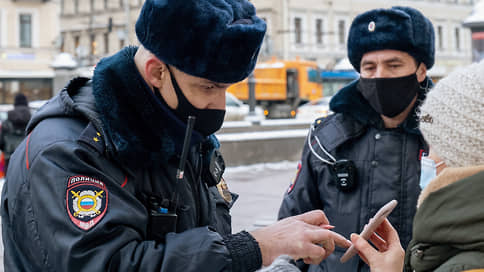Insult in word and deed – Newspaper Kommersant No. 68 (7513) of 04/19/2023
[ad_1]

Insulting a military or official on the Internet falls under an article of the Criminal Code (CC), the Supreme Court points out. They prepared clarifications on the application of the norms of the Criminal Code on encroachments on the life, health and dignity of law enforcement officers or their relatives. In particular, the highest court proposes to consider as the use of violence against a representative of the authorities, including threats that did not entail any consequences for the health of the victim, but frightened him. However, the court clarifies, if violent acts are committed in response to illegal acts by law enforcement agencies, then they can be recognized as necessary defense.
The Supreme Court (SC) on Tuesday discussed and sent for revision a draft resolution of the plenum of the Supreme Court, which explains the intricacies of qualifying crimes against government officials and law enforcement officers. We are talking about both encroachments on their life and health, and an attack on their dignity. In particular, the Supreme Court recalls that actions and statements against officials that humiliate their honor and dignity fall under the article of the Criminal Code on insulting a representative of the authorities. This can be swearing, posting defamatory information on the Internet, or even “other actions” – for example, tearing off a uniform headdress or shoulder straps. In any case, the court clarifies, a prerequisite for criminal liability for insulting a representative of power in the performance of his duties is the public nature of such actions – for example, expressing insults in public places, during mass events, posting offensive information in the media, on websites, forums or blogs on the Internet or mass mailing of electronic messages.
According to the Supreme Court, last year under Art. 317, 318 and 319 of the Criminal Code, a total of 14,526 people were convicted. Among them, 28 persons were punished for encroachment on the life of a law enforcement officer (Article 317), 8586 for violence against a representative of the authorities (Article 318) and 5912 for insulting (Article 319). Over the past three years, the number of crimes against representatives of the authorities is not growing, said the judge of the Supreme Court Elena Peysikova, but each of these crimes significantly worsens the management procedure. According to her, the Prosecutor General’s Office, the FSB, the Ministry of Internal Affairs, the Ministry of Justice, the National Guard and other interested departments actively participated in the preparation of the draft resolution. As a result, a detailed explanation appeared in the text of the resolution who should be considered law enforcement officers – they can include both officials and simply employees of the relevant structures, “endowed with the authority to protect public order and ensure public safety,” clarifies the Armed Forces. Under the enhanced protection of the Criminal Code, there are also employees of regulatory bodies, the court recalls, such as the Federal Tax Service, Rostekhnadzor or Rospotrebnadzor.
The circle of close persons of a law enforcement officer under the protection of the law is also expanding: these are not only his close relatives and in-laws, but also people whose health and well-being are “dear to the victim due to established personal relationships”.
However, the Supreme Court has not yet decided how to qualify the simultaneous insult of a representative of power and the use of violence against him – according to the totality of articles or as one crime. The draft resolution provides for both options, one of which will be included in the final version of the document. The Prosecutor General’s Office, the Ministry of Internal Affairs, the TFR and the Russian Guard are in favor of the first option, said Judge Peisikova, the Ministry of Justice is in favor of the second, the opinions of regional courts were divided equally.
According to Art. 318 on violence against a representative of the authorities, the Armed Forces consider it necessary to punish for beatings or other violent acts: tying hands, using handcuffs, leaving them indoors. Also punishable are threats that did not entail any consequences for the health of the victim, but seriously frightened him. However, the court clarifies, if an attack on a representative of the authorities was committed in response to illegal actions on his part, then “if there are grounds for this”, it can be recognized as a necessary defense or qualified as a crime against a person.
Pavel Filippov, Associate Professor of the Faculty of Law at Moscow State University, notes that this is the first clarification of the highest court regarding encroachments on the life, health and dignity of government officials. He hopes that the document will provide an answer to many questions that theorists and practitioners have, especially after the decriminalization of the “main” Art. 130 of the Criminal Code on insult. The expert also calls it “important and correct” the explanation that the use of violence against a representative of the authorities can be recognized as necessary defense.
Lawyer Dmitry Agranovsky says that he would not advise anyone to determine by eye whether the actions of law enforcement officers are lawful or not: it’s better to obey and then appeal. But such “conscious” resistance is not specific to our country at all, since citizens do not feel sufficiently protected, he adds. Therefore, cases of violence against government officials are more of a domestic nature, the lawyer notes: they are repulsed, they try to free the detainees or run away. In any case, people are not guided by ideological motives, Mr. Agranovsky notes. He, according to him, never encountered such gestures as tearing off shoulder straps or knocking off caps.
[ad_2]
Source link








